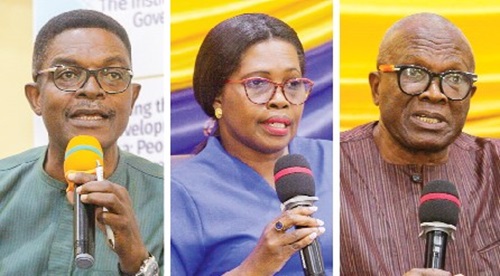Three political scientists and a legal luminary have stressed the need for the election of metropolitan, municipal and district chief executives (MMDCEs) on partisan lines.
During a panel discussion yesterday on the country's local government system at the 76th Annual New Year School, they said doing so would enhance democratic governance in the country and improve accountability at the local level.
The panellists are an independent scholar and political scientist, Professor Joseph Atsu Ayee; a former Dean of the University of Ghana (UG) School of Law, Prof. Kofi Quarshigah; a Senior Lecturer and former Head of the Department of Political Science, UG, Dr Maame Adwoa Gyekye-Jandoh, and the Executive Director of the Institute for Democratic Governance (IDEG), Dr Emmanuel Akwetey.
They were of the view that the election of the MMDCEs by the citizenry on political party lines would ensure inclusive development and improve public services at the local assemblies.
They further cited examples from other jurisdictions such as Nigeria, Kenya, South Africa, the United Kingdom and Germany where local authorities were elected by the people on a partisan basis that have enhanced good governance at the local level to buttress their point.
The discussion focused on Ghana's Local Government System, Citizens Engagement, Security and Peace Building, on the sub-theme: "Peace Building, Digital Accountable Democratic Governance and Citizens Engagement: Improving Transparency, Efficiency and Citizens Participation."
The panel discussion was organised by IDEG in partnership with the UG School of Continuing and Distance Education (SCDE) as part of the ongoing 76th Annual New Year School.
Fine-tuning
Prof. Ayee, in his submission, called for a reform of the current local governance system, adding that the current system required fine-tuning, which went beyond mere administrative adjustments.
"The current local government system that we have needs fine-tuning. Fine-tuning means we need transformative reform rather than administrative reform," he stressed.
"If you look at the current legal system, we are saying that the parties should not be involved. But we all know that the political parties are involved, even though they have to be banned," Prof. Ayee added.
He identified several key areas that necessitated reforms, including the involvement of political parties in the governance process.
Despite the legal framework discouraging party involvement, Prof. Ayee observed that political parties continued to play a significant role, highlighting the need for a more nuanced approach.
Another critical issue Prof. Ayee raised was the appointment of MMDCEs by the President.
That, he argued, created a situation where MMDCEs felt more accountable to the President than to the electorate, leading to impunity and disrespect towards traditional leaders and other stakeholders.
The political scientist also expressed concerns about the lack of transparency and accountability within the local government system.
Prof. Ayee stated that assemblies were expected to display meeting minutes and track records, but those practices were not being complied with.
Furthermore, the assemblies had failed to promote basic development initiatives such as sanitation, resulting in poorly maintained communities, he added.
To address those challenges, Prof. Ayee advocated transformative reform that prioritised accountability, transparency and development.
He emphasised the need to bring the electorate back into the fold, encouraging active participation in the local government process.
Opening up
Prof. Quarshigah, for his part, stressed the need for comprehensive reforms in Ghana's local government elections.
He said the current system which virtually restricted participation to activists of the governing party should be expanded to allow different political parties to contest.
This inclusive approach, Prof. Quarshigah argued, would attract competent citizens from diverse political backgrounds to foster a more representative and accountable system.
By opening up the electoral process, he said it would ensure that local governments were truly responsive to the needs of their constituents.
Prof. Quarshigah also highlighted the potential for such reforms to trigger broader institutional changes, including the civil service and local government service.
That, in turn, would enable the institutions to better serve the people and deliver essential services, he added.
Party competition
Dr Gyekye-Jandoh, for her part, argued that opening up the local-level election to political party competition would significantly enhance the country's democracy.
That move, she said, would not only sustain democracy but also make it more authentic, departing from the current system.
She said research had shown that competitive elections could foster democratic qualities, such as participation and accountability.
"I would argue that we should give it a try having political party competition at the local level as it will actually enhance our democracy and sustain our democracy and make it a true democracy rather than this kind of system that we have," Dr Gyekye-Jandoh said.
IDEG was for the elections of the MMDCEs on partisan lines, its Executive Director stated.
Dr Akwetey explained that for the past 32 years, the country had practised the current local governance system and it was time to shift the focus to electing MMDCEs to make it more responsive and effective to the development needs of the people.
Recall
A referendum to amend Article 55 (3) of the 1992 Constitution to pave the way for the election of MMDCEs in 2019 suffered a setback because of the lack of consensus from the two major political parties, the National Democratic Congress (NDC) and the New Patriotic Party (NPP).
The NPP wanted political party-sponsored candidates to contest the election of the MMDCEs while the NDC wanted the election to be held devoid of partisan politics.

